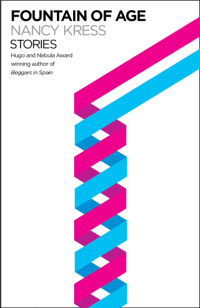
Published by Small Beer Press on May 8, 2012
Nancy Kress puts the science in science fiction, but more importantly, she tells stories about people. Too many writers of hard sf believe that inventive ideas are enough to carry a story. Kress knows that there is a difference between a science essay dressed up as fiction and an actual story. Beyond her emphasis on realistic characters and human emotions, her stories are defined by graceful, elegant prose. With only one exception, the stories in this collection -- all of which were published between 2007 and 2009 -- are excellent. Six of the nine are outstanding.
Kress blends humor with intrigue in "The Erdmann Nexus" as an elderly physicist and other senior citizens in his retirement home share flashes of memory -- or, as the physicist perceives them, not memories but real-time experiences. Meanwhile an alien ship executes a hasty and unexpected change of course and a ballet dancer's necklace becomes the focus of everyone's attention. How do those storylines intersect with that of the battered woman who acts as the physicist's caretaker? Ingeniously. With its sharp ideas, multi-faceted characters, and elements of mystery shrouded in science, "The Erdmann Nexus" won a well-deserved Hugo. This is short sf at its finest.
A senior citizen also headlines the Nebula-winning title story. "Fountain of Age" deals with tissue regeneration, the history of the Romani people, and creative crime, but it is fundamentally a story of enduring love tempered with sacrifice and regret. Suspense and deft plotting make this a riveting read, but it is again the carefully crafted characters that make the story memorable.
Genetic modification is a recurring theme in these stories. After a biological attack devastated Sichuan Province, a Chinese woman travels to America and becomes pregnant with a child who, unbeknownst to her, has been genetically modified. She returns to China to give birth to a child who needs to ingest a protein inhibitor every week. "First Rites" focuses on the unusual relationship between the hyperactive child and the neuroscientist who created (and illegally administered) his life-saving drug -- and the child's even more unusual response to his genetic modification. This is the cleverest application of the principle that "observation affects outcome" I've encountered. It also highlights another recurring Kress theme -- the danger of treating scientific skepticism as if it were a religion.
Kress takes the concept of children as weapons to another level in "Safeguard," as children genetically enhanced to serve as bioweapons escape from the dome in which they were raised. The story poses a moral question by pitting compassion for innocent children against the safety of a nation. Unfortunately, the potential power that lurks in this story is diluted by an ending that I regard as something of a cop-out.
Aliens visit Earth in two stories. In "The Kindness of Strangers," a woman's life is complicated in mundane ways before aliens cause cities to vanish. Stranded with a group of people inside an invisible dome outside of Rochester, the woman eventually learns why the aliens acted as they did, while at the same time learning something important about herself. Aliens have a less conventional reason for dropping by in 'Laws of Survival," a strange, touching, and wonderfully imaginative post-apocalyptic story about dogs and love.
Also taking place in a post-apocalyptic setting -- one where religious superstition has flourished -- is "By Fools Like Me." The paper books that have survived are sinful; trees are sacred. Still, an elderly woman, rejecting the doctrine that "a little bit of sin is as bad as a big sin," finds comfort in Alice in Wonderland, Jane Eyre, and a field guide to birds that no longer exist.
"End Game" posits that the ability to concentrate intensely on a single subject, blocking out all unrelated thoughts, is less desirable than it may seem -- and it may be contagious. This is an interesting story but not one of Kress' best.
"Images of Anna" answers the question "How much should you change for love?" as a photographer takes pictures of Anna that show individuals other than Anna. More fantasy than sf, the story is, to my mind, the weakest in the collection, the only one I didn't much like.
Still, two-thirds of the stories in this collection struck me as nothing short of brilliant. The stories showcase Kress as one of the premiere writers of science fiction -- and as a remarkably skillful storyteller, regardless of genre.
RECOMMENDED